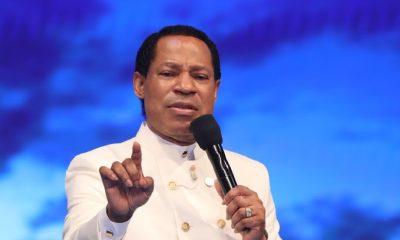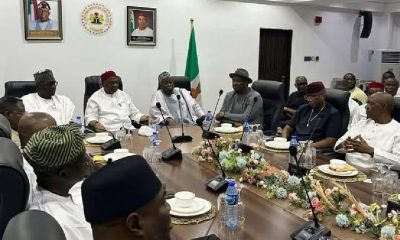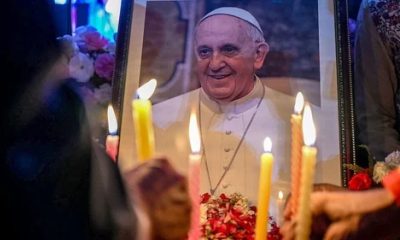Economy
FG Should Be Careful On Ability To Pay Back Loans – Cardoso

The Central Bank of Nigeria has warned Nigeria and other West African nations regarding trends in borrowing practices.
Traditionally, nations often relied on loans from the Paris Club, a group of creditor countries.
However, the CBN said it has observed a significant shift towards borrowing from non-Paris Club members and private lenders, such as banks and investors who buy government bonds.
The West African Institute for Financial and Economic Management has warned that Nigeria is at a high risk of falling into debt distress and urged the federal government to look for ways of improving revenue generation.
Governor of the CBN, Yemi Cardoso, gave the warning in Abuja at the Joint World Bank/IMF/WAIFEM Regional Training on Medium Term Debt Management Strategy in Abuja on Monday.
Represented by Dr Mohammed Musa Tumala, Director of the Monetary Policy Department of the CBN, Cardoso noted that while this change in who countries owe money to might seem like a minor detail, he emphasised that it is a critical development with serious implications.
He argued that the way countries manage debt owed to the Paris Club may not be as effective for these new lenders. Cardoso expressed concern that this new debt landscape could pose a threat to financial stability and economic recovery for many countries.
Cardoso said, “Public debt dynamics are increasingly influenced by significant debt servicing obligations to non-Paris Club members and private lenders, including commercial banks and bond investors.
“This shift in the debt structure represents a critical evolution in the global financial framework, with profound ramifications for public debt management in our countries.”
He also stated that recent events like the COVID-19 pandemic, geopolitical conflicts, and natural disasters have put a strain on many countries’ finances, making them more likely to seek loans from diverse sources.
However, these non-traditional lenders might come with stricter repayment terms and potentially higher risks compared to Paris Club loans.
“Following the COVID-19 pandemic, along with other developments such as geopolitical conflicts and natural disasters, the financial strain on our sub-region has escalated, posing a threat to their macroeconomic and financial stability and prospects for faster recovery,” he said.
Nigeria, despite being classified as having generally moderate debt risk, the CBN urged the federal government to remain cautious, particularly regarding potential liquidity risks. These risks, if not addressed effectively, could stem from weak revenue mobilization, a persistent challenge hindering debt sustainability and economic stability.
What the CBN is saying is that while Nigeria’s overall debt risk is considered moderate, the country still needs to be careful about its ability to pay back its loans (liquidity risk). This risk could become a problem if the government doesn’t collect enough revenue (money) in the future.
Dr Baba Yusuf Musa, Director General of the West African Institute for Financial and Economic Management told journalists, “When you compare Nigeria with the rest of the world or peer countries, you realise that with the 37 per cent debt to GDP ratio, we still have room to borrow but the issue with the Nigerian debt is you don’t use GDP to pay debts rather you use the revenue to pay for any debt”
He added, “If you look at it from the revenue side Nigeria is at a high risk of debt distress in terms of our borrowing so what we need to do now is to step up our capacity to generate revenue, the more revenue we have, the less ratio of debt to revenue we have.”
WAIFEM, he said, is “very much in support of what the federal government is doing because there is a window for the government to raise more revenue, all that the people need to do is to support the federal government diversify the sources of revenue and of course generate more sources of revenue, once we have this we don’t have debt problem but rather revenue problem.
He added, “What the Medium Term Debt Strategy does is that it smoothens the debt service so that going forward when borrowing, you take into consideration the redemption profile that you have and the type of loans that you have in your existing portfolio and then it will enable you also to minimise the cost and risk the future loans will add to the debt portfolio.”
Economy
States face allocation cuts as agency demands N100bn monthly

The monthly statutory allocations to state governments from the federation account may decline in the coming months following an official request by the Nigeria Sovereign Investment Authority to boost the nation’s residual funds with the support of N100bn monthly.
The request, which was presented by the Managing Director and Chief Executive Officer of NSIA, Aminu Umar-Sadiq, is aimed at unlocking large-scale investments to drive Nigeria’s economic growth.
He made the request at the March revenue-sharing meeting of the Federation Account Allocation Committee held between April 14 and 15, 2025. Our correspondent obtained a copy of his presentation during the meeting on Friday.
Umar-Sadiq appealed to the committee, which includes state commissioners of finance, to consider and approve the request, with funding proposed to commence from the March FAAC allocation.
The presentation was titled, “Activating Residual Funding for the Nigeria Sovereign Investment Authority – Unlocking Opportunities for Large-Scale Investments to Drive Nigeria’s Economic Growth.”
According to the document, the NSIA is requesting a structured monthly disbursement of N100bn from Residual Funds—revenues in the Federation Account beyond projected hydrocarbon income—to establish a Naira-based investible capital pool.
The move, the authority says, will enhance its capacity to finance critical domestic infrastructure projects.
The MD said, “The funding would position the authority as a leading sovereign wealth fund globally, promoting responsible and strategic investments for Nigeria’s economic development and enhancing its threefold mandate to build a savings base for the country, enhance the development of infrastructure, and provide stabilisation support.”
He explained that residual funds are a legitimate source of funds transferred to the authority, provided that the derivation portion of the revenue allocation formula shall not be included as part of this funding.
Economy
More Nigerians to experience poverty by 2027 – World Bank

The World Bank’s latest Africa’s Pulse report has projects a grim future for Nigeria, with poverty expected to rise by 3.6 percentage points by 2027.
Released during the IMF and World Bank Spring Meetings in Washington, DC, the report cites Nigeria’s reliance on oil, economic fragility, and governance challenges as key drivers.
It highlights the country’s structural economic weaknesses, dependence on oil revenues, and national fragility as key barriers to meaningful poverty reduction.
“Poverty in resource-rich, fragile countries, including large economies like Nigeria and the Democratic Republic of Congo, is projected to increase by 3.6 percentage points between 2022 and 2027,” the report stated.
Despite recent growth in Nigeria’s non-oil sector during the last quarter of 2024, the World Bank warns that this progress is unlikely to translate into widespread poverty alleviation due to ongoing fiscal and institutional challenges.
The report emphasizes that Sub-Saharan Africa remains the world’s poorest region, with an overwhelming 80% of the globe’s 695 million extreme poor residing there in 2024.
Within the region, half of the 560 million extremely poor people were located in just four countries, including Nigeria.
In stark contrast, South Asia accounted for 8% of the world’s extremely poor population, East Asia and the Pacific 2%, the Middle East and North Africa 5%, and Latin America and the Caribbean 3%.
The World Bank attributes the rising poverty in Nigeria and similar economies to weakening oil prices and fragile governance structures, noting: “This follows a well-established pattern whereby resource wealth combined with fragility or conflict is associated with the highest poverty rates, averaging 46% in 2024, which is 13 percentage points higher than in non-fragile, resource-rich countries.”
Meanwhile, non-resource-rich countries in Africa are experiencing stronger economic growth and faster poverty reduction, buoyed by high agricultural commodity prices and more resilient fiscal policies.
To reverse Nigeria’s downward poverty trend, the World Bank recommends reforms that prioritize inclusive economic growth and stronger public financial management.
It calls on the government to focus on “improving fiscal management and building a stronger fiscal contract with citizens to promote inclusive economic development and long-term poverty alleviation.”
Economy
SEE current exchange rate of the Dollar to Naira

What Is the Dollar to Naira Exchange Rate at the Black Market (Aboki FX)?
Here is the Dollar to Naira exchange rate at the parallel market, popularly known as the black market (Aboki fx), for Tuesday, April 23, 2025.
You can exchange your dollars for naira at the following rates:
Black Market Exchange Rate (Lagos – April 23, 2025):
According to sources at the Bureau De Change (BDC), the exchange rate at the Lagos parallel market saw traders buying at ₦1610 and selling at ₦1620 per US dollar.
It’s important to note that the Central Bank of Nigeria (CBN) does not recognize the black market. The CBN advises individuals seeking foreign exchange transactions to do so through their banks.
Dollar to Naira Exchange Rates
Market Type Buying Rate Selling Rate
Black Market ₦1610 ₦1620
CBN Official Rate ₦1591 (Low) ₦1606 (High)
Note: Forex rates vary across dealers and regions, and actual rates may differ from those listed.
Meanwhile, the Nigeria Customs Service (NCS) has announced the seizure of 298 smuggled items worth ₦7.6 billion between January and March 2025. The NCS also disclosed that it generated a total revenue of ₦1.75 trillion in the first quarter of the year.
-

 News22 hours ago
News22 hours agoJust in: Gunmen invade pro-Wike group in Bayelsa
-

 News7 hours ago
News7 hours agoDSS arrests Army major for planning unrest in Delta
-

 Politics8 hours ago
Politics8 hours agoSee list of APC Delta stakeholders holding meeting in Abuja on power sharing formula with Oborevwori
-

 News8 hours ago
News8 hours agoFCT minister, Wike announces new appointments
-

 Sports23 hours ago
Sports23 hours agoJust in: Chelsea maintains top 4 position after thrashing Everton 1-0
-

 News8 hours ago
News8 hours agoCOVID-19 Vaccine Killed Pope Francis, says Pastor Oyakhilome
-

 News8 hours ago
News8 hours agoOborevwori absent as Delta APC leaders meet with Uzodinma in Abuja
-

 News22 hours ago
News22 hours agoPope Francis finally laid to rest






